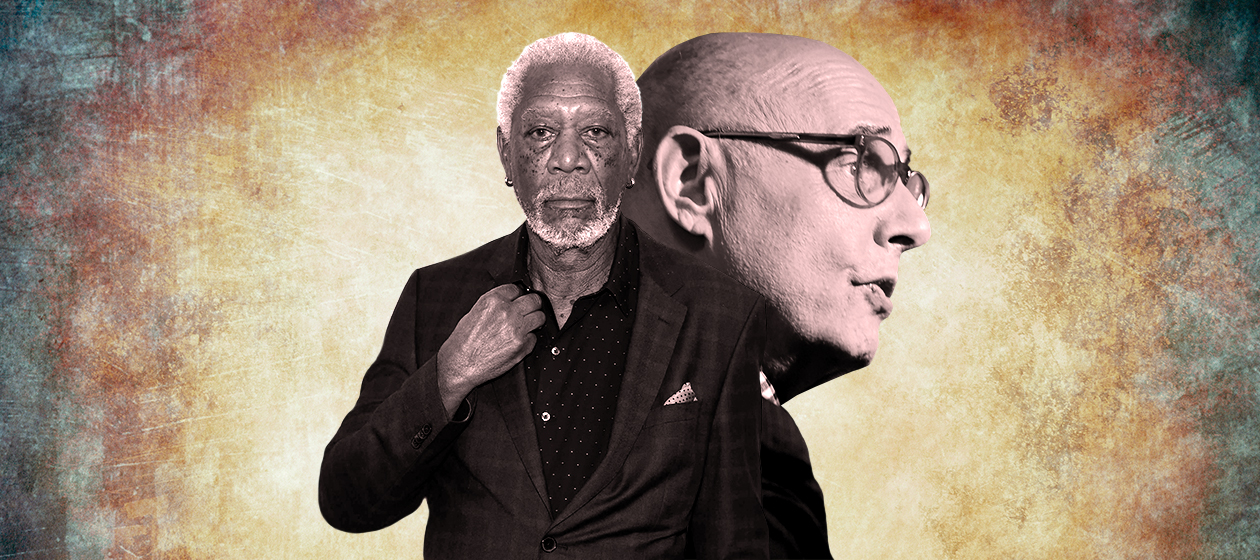How #MeToo abusers fundamentally deny their victims' agency
It wasn't as bad as…


A free daily email with the biggest news stories of the day – and the best features from TheWeek.com
You are now subscribed
Your newsletter sign-up was successful
It wasn't as bad as…
The argument for the #MeToo movement going too far, for becoming a witch hunt, can be reduced to these five words. I looked but it wasn't as bad as touching. I yelled but it wasn't as bad as beating. I fondled but it wasn't as bad as rape. There is a line constantly being redrawn which separates bad from worse. Actors Jeffrey Tambor and Morgan Freeman have become the latest examples of a sort of patriarchal pass which excuses certain behavior because it isn't, say, Harvey Weinstein- or Bill Cosby-level bad.
The problem is that not only does this excuse bad behavior by comparing it to worse behavior, but that by defining their accusers' experiences for them, the accused fundamentally deny their victims' agency. And the problem is endemic.
The Week
Escape your echo chamber. Get the facts behind the news, plus analysis from multiple perspectives.

Sign up for The Week's Free Newsletters
From our morning news briefing to a weekly Good News Newsletter, get the best of The Week delivered directly to your inbox.
From our morning news briefing to a weekly Good News Newsletter, get the best of The Week delivered directly to your inbox.
When eight people recently accused Morgan Freeman of various levels of inappropriate behavior — from staring to sexual comments to unwanted touching — the 80-year-old Oscar winner responded by separating his actions from assault and harassment. "[I]t is not right to equate horrific incidents of sexual assault with misplaced compliments or humor," he claimed. "I did not create unsafe work environments. I did not assault women. I did not offer employment or advancement in exchange for sex.” The classic I'm-sorry-you-were-offended non-apology.
The Shawshank Redemption star, whose film company one ex-staffer described as "toxic," seems to believe that because his intentions were not to make people feel bad, no one should feel that way. His approach recalls Daphne Merkin's op-ed in The New York Times earlier this year, which asked, "Shouldn't sexual harassment, for instance, imply a degree of hostility?" Both of these perspectives are more focused on the feelings of the accused than the accuser.
A similar disregard of the victim's experience took place during a recent Times conversation with the cast of Arrested Development. Five of the Netflix series' male cast members, including Jeffrey Tambor, who was fired from Transparent after being accused of sexual misconduct, ultimately drowned out the voices of two of the show's actresses, Alia Shawkat and Jessica Walter. Despite Walters' emotional response, the actors, including Tony Hale, excused Tambor's behavior with explanations of context. It was a "family" argument, Jason Bateman claimed. Tambor had learned from the experience, David Cross said.
Patriarchal society's habit for empathizing with the oft-male accused is so entrenched that even the accusers can find themselves inadvertently falling in step. Walter's contradictory response offered an archetypal example.
A free daily email with the biggest news stories of the day – and the best features from TheWeek.com
When Bateman argued it was common to find "difficult" people in entertainment, Shawkat replied, "But that doesn't mean it's acceptable." Through tears, Walter followed this up with, "He never crossed the line on our show, with any, you know, sexual whatever. Verbally, yes, he harassed me, but he did apologize." While her crying indicated how deeply affected she was by Tambor's actions, she still felt the urge to excuse him because it was not "sexual whatever" and he had apologized.
Contrast this very feminine instinct to adhere to social graces — to smooth things over — even though Walter had done nothing wrong, to Cosby's misplaced "Hey, hey, hey!" call during his sexual assault trial or to Weinstein's inappropriate grin during his perp walk. As Leah Carroll explained at Refinery29, Weinstein "smiled for the cameras because he knew how quickly those handcuffs would come off." The accuser, accustomed to no such privilege, is more likely to toe the line.
Bateman acknowledged this power imbalance in an apology released on Twitter following the Times interview, admitting he "underestimated" Walter's feelings and offering a corrective. "[T]here's never any excuse for abuse, in any form, from any gender," he said. "And, the victim's voice needs to be heard and respected. Period." This is a welcome change from Matt Damon's attempt back in December to parse the various levels of abuse in response to the allegations against Weinstein. The actor and former Weinstein protégé said on ABC, "I do believe that there's a spectrum of behavior, right? And we're going to have to figure — you know, there's a difference between, you know, patting someone on the butt and rape or child molestation, right?"
More recently, comedian Sarah Silverman, on the subject of her various male friends — Louis C.K., Aziz Ansari, Al Franken — who have been accused of sexual harassment, appeared to hone in on why Hollywood and so many other industries are inclined to give their accused so much consideration. "People are very sure about what is right and wrong until it comes to their front door," she told GQ.
Everyone has their own threshold. But what is right and what is wrong has up until now been largely determined by men who have placed themselves in positions of power and established a system that best serves them. The line was theirs to cross. In the wake of #MeToo, this system has started to crumble and those outside positions of power have become empowered to draw their own lines. "There is inherent strength in agency," #MeToo founder Tarana Burke told The Guardian in January. "And #MeToo, in a lot of ways, is about agency."
This is the agency of the accuser, who has the right to define their own spectrum of right and wrong, their own threshold. This is not about #MeToo going too far, it is about a movement that is expansive enough to encompass us all.
Soraya Roberts is the author of In My Humble Opinion: My So-Called Life. She is a regular long-form culture writer for Hazlitt, for which she has been nominated for a National Magazine Award. She has also contributed to The New York Times Magazine, Vanity Fair, The New Republic, and The Baffler, among other publications. Prior to going freelance, she was an entertainment editor for The New York Daily News, AOL Canada, and Time Out Dubai.
-
 Political cartoons for February 16
Political cartoons for February 16Cartoons Monday’s political cartoons include President's Day, a valentine from the Epstein files, and more
-
 Regent Hong Kong: a tranquil haven with a prime waterfront spot
Regent Hong Kong: a tranquil haven with a prime waterfront spotThe Week Recommends The trendy hotel recently underwent an extensive two-year revamp
-
 The problem with diagnosing profound autism
The problem with diagnosing profound autismThe Explainer Experts are reconsidering the idea of autism as a spectrum, which could impact diagnoses and policy making for the condition
